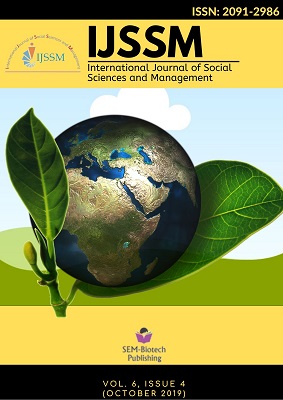Commercialization of Mandarin Orange in Solukhumbu District, Nepal: Input, Production, Storage and Marketing Problem Assessment
DOI:
https://doi.org/10.3126/ijssm.v6i4.26223Keywords:
mandarins, constraints, commercialization, inputs, productionAbstract
With the aim to assess major constraints and opportunities in commercialization along with the study of control measures and apposite services provided by stakeholders, the survey among 75 households from 5 different clusters in major citrus producing Dudhkoshi and Thulung Dudhkoshi regions during 2018 was conducted. The result from the pilot study portrays that – despite the long-term farming experiences in citrus, mandarins were unproductive in their orchards. Lack of technical knowledge, input supply, road and market access regarding commercial citrus farming has been major limiting aspect for orchard management and production. Likewise, condition of mechanical tools and record keeping was found poor from direct observation. 49.33% did not have storage facility for the fruit; problem on post-harvest and marketing was followed by poor transportation facility. The market for mandarin was the local market for 34 respondents where the price per kg was NRs. 77.94 which was significantly higher than the farmgate price (NRs. 49.02) at 5% level of significance. The fruit has invincible quality and taste. The development of collection centers, frequent monitoring and trainings for progressive farmers and input supplies management from government and private sectors are suggested, which can promote the productivity of citrus; thus, farming of mandarin can enhance livelihood and can be sustainable venture for the study area.
Downloads
Downloads
Published
How to Cite
Issue
Section
License
This license enables reusers to distribute, remix, adapt, and build upon the material in any medium or format for noncommercial purposes only, and only so long as attribution is given to the creator.




